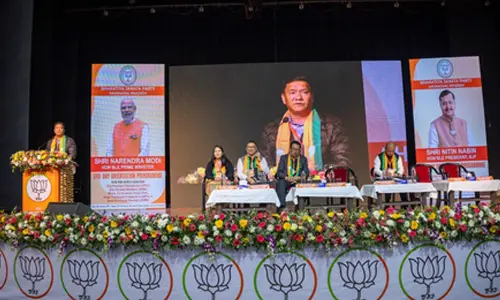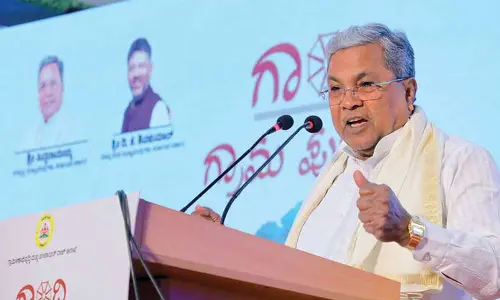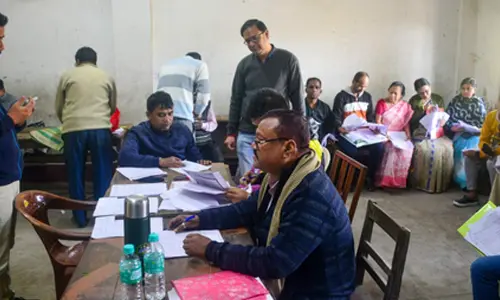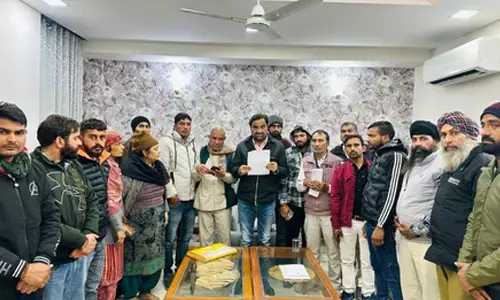Dodging duty to disclose RTI info

An information request sought list of appropriate education programmes of comparable quality specified or approved by the UGC for the purpose of career advancement scheme etc, and whether training programme for ‘script development for preparing audio video tapes’ conducted by IGNOU New Delhi is specified or approved by the UGC as appropriate continuing education programme of comparable quality as
An information request sought list of appropriate education programmes of comparable quality specified or approved by the UGC for the purpose of career advancement scheme etc, and whether training programme for ‘script development for preparing audio video tapes’ conducted by IGNOU New Delhi is specified or approved by the UGC as appropriate continuing education programme of comparable quality as mentioned in career advancement scheme of UGC.
Under Secretary and PIO Satish Kumar has simply stated, “the UGC does not have information on the queries.” First Appellate Authority Dr (Mrs) Renu Batra, Joint Secretary, as a responsible officer should have considered what was asked at least. She simply declared that in her “considered view the reply of PIO was satisfactory.” It reached the CIC in second appeal.
There is a right to information provision within the UGC Act in Section 12 (h)&(i). Section 12 gives general power to determine and maintain the standards of teaching, examination and research. Section 12 of UGC Act says:
“It shall be the general duty of the Commission to take, in consultation with the Universities or other bodies concerned, all such steps as it may think fit for the promotion and co-ordination of University education and for the determination and maintenance of standards of teaching, examination and research in Universities, and for the purpose of performing its functions under this Act, the Commission may:
(h) collect information on all such matters relating to University education in India and other countries as it thinks fit and make the same available to any University;
(i) require a University to furnish it with such information as may be needed relating to the financial position of the University or the studies in the various branches of learning undertaken in that University, together with all the rules and regulations relating to the standards of teaching and examination in that University respecting each of such branches of learning”
Thus, under Section 12 of UGC Act read with RTI Act 2005, UGC has a duty to collect and provide information to the citizens seeking it. In 1984, the UGC Act was amended and powers of Regulation of fees and prohibition of donations in certain cases were added as Section 12 A(1).
Section 12 (3) says: Where regulations of the nature referred to in sub-section (2) have been made in relation to any course of study, no college providing for such course of study shall:
a) levy or charge fees in respect of any matter other than a matter specified in such regulations;
b) levy or charge any fees in excess of the scale of fees specified in such regulations, or
c) accept, either directly or indirectly, any payment otherwise than by way of fees; or any donation of gift (whether in cash or kind), from, or in relation to, any student in connection with his admission to, and prosecution of, such course of study.
(4) …the Commission may, with the previous approval of the Central Government, pass an order prohibiting such college from presenting any students then undergoing such course of study therein to any university for the award of the qualification concerned.
Section 14 says: If any University grants affiliation in respect of any course of study to any college referred to in subsection (5) of section 12A in contravention of the provisions of that sub-section or fails within a reasonable time to comply with any recommendation made by the Commission under section 12 or section 13, or contravenes the provision of any rule made under clause (f) or clause (g) of sub-section (2) of section 25, or of any regulation made under clause (e) or clause (f) or clause (g) of section 26, the Commission, after taking into consideration the cause, if any, shown by the University for Such failure or contraventions may withhold from the University the grants proposed to be made out of the Fund of the Commission.
As per Section 12 and 12A, the UGC can regulate the standards and the fee prescribed for a programme resulting in award of degree. If a degree or programme is objected to by the UGC, any University or institution cannot award that degree, and if it still awards, it is an offence under Section 24.
Section 24 empowers UGC to impose penalties: Whoever contravenes the provisions of section 22 or section 23 shall be punishable with fine which may extend to one thousand rupees, and if the person contravening is an association or other body of individuals, every member of such association or other body who knowingly or wilfully authorises or permits the contravention shall be punishable with fine which may extend to one thousand rupees.
The UGC emblem contains a motto sentence in Sanskrit, “jnaan vijnaan vimukthaye (=Knowledge liberates), which also imposes a duty to provide at least information, if not the ‘knowledge’. Information in the form of ‘clarification’ also liberates the appellants under RTI Act from certain doubts.
UGC being an academic regulatory has statutory duty to inform/educate the people about the courses/degrees and their validity. It is the core function and power of the UGC to prescribe standards and recognise universities/institutions and their courses, and thus they have a responsibility to clarify. This is such clarification, that none other than UGC can give.
The Commission considers this as a policy-deficit in public authority exposed by such RTI applications. The RTI Act mandates UGC under section 4(1)(c)&(d) to voluntarily disclose such aspects of their educational policy to the people affected including the appellant in this case. In fact, the UGC has to understand the doubts of such students or parents and recognise the need for clarification arising out of such RTI applications and prepare the FAQs accordingly.
Duty of UGC
The UGC being an academic regulatory has statutory duty under Section 4(1)(c) & (d) of RTI Act to inform/educate the people about the courses/degrees and their validity as mandated by law discussed above. The UGC cannot forget that they recognise universities/institutions and their courses after examining the compliance with prescribed standards. Though it appears to be technically right according to Section 2(f), sheltering it under this will leave student community in confusion regarding validity of a course.
The increase in the number of RTI applications based on doubts reflects negatively on the public authority leading to an inference that the UGC is not properly communicating to the people. The RTI Act mandates under section 4(1)(c) & (d) UGC to voluntarily disclose such aspects of educational policy to the affected people including the appellant in this case. CIC under section 19(8)(a)(iv) required the public authority to make necessary changes in their practice and under 19(8)(a)(iii) publish this clarification as information in the form of FAQ.
Enforceability of Section 4 through other sections
Public authorities generally plead that Section 4 is not directly enforceable by the Commission. But the information sought in this appeal is supposed to be voluntarily disclosed under Section 4 of RTI Act. They denied when same was sought under Section 3. A citizen’s RTI request necessitates enforcement of right by the Commission.
Thus the UGC or any public authority cannot refuse to give clarifications if it is part of their duty. Section 4(1)(b), (C) and (d) will become enforceable and it has every authority to initiate penal proceedings under Section 20, if the information disclosable under three sub clauses of Section 4 was sought under an RTI application under Section 3 read with Section 6 of RTI Act.
CIC directed the PIO to show-cause why penalty should not be imposed for refusing to inform and abdication of responsibility both under UGC Act and RTI Act. (based on decision in CIC/CC/A/2014/001770-SA in Ram Kishan Sharma v. PIO, UGC on 27th Sept 2016)














